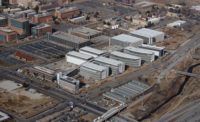
Economic headwinds resulting from the ongoing financial crisis in Europe will remain one of the major factors buffeting the U.S. construction economy through the rest of the year and into 2013, economist Anirban Basu told an annual gathering of the Construction Financial Management Association in Orlando in late June.
The industry economist admitted that his projection that Europe's economy will continue to struggle through 2013 runs counter to some forecasts. The International Monetary Fund, for example, believes the austerity plans being implemented by a number of European countries will lead to recovery in 2013.
However, Basu said, "The austerity programs are falling apart, and the assumptions are not working." Instead of producing economic growth, these programs are causing national economies to shrink while failing to reduce deficits.
Whereas the economic crisis in the U.S. has dealt primarily with private credit, Europe's has revolved around public debt. Also, the additional downsizing of European economies from austerity measures is creating a private-debt problem by straining business activity.
A few days after the CFMA convention, news of the latest economic deal announced on June 29 by euro-zone leaders pushed global stock markets higher. But Basu sees little longer-term benefit.
"Some investors had been expecting the worst from policymakers in Europe, and instead they received news of further accommodation regarding borrowing costs," Basu told ENR. However, he added, "This doesn't imply a near-term solution to the European crisis, and I still expect that the U.S. economy will be under pressure. The world now appears to be in the midst of a synchronized slowdown."
Congressional inaction on a host of pending changes to tax rates and regulations also is dampening the U.S. economy and will likely continue to do so into 2013.
If the so-called "Bush-era tax cuts" are allowed to end, for example, capital-gains rates would increase to 20% from 15%, Basu says. Also, dividends would then be treated as normal income, thereby increasing the rate of taxation to 39.6% from 15%.
"You wonder why capital sits on the sidelines," Basu said. "They don’t know how their dividend is going to be taxed. And that's bad for construction."
In all, if the Bush-era tax breaks and the payroll tax cut both expire, and the roughly $109 billion in automatic spending cuts mandated by the Budget Control Act of 2011 go into effect, Basu estimates $700 billion would be cut from the economy—a scenario he refers to as "accidental austerity."
Without some type of congressional action on these matters, Basu says, "We can't conclude that next year will be a year of economic growth—neither can investors and neither can anyone trying to push a project forward."
Incoming CFMA Chairman Erika Urbani, chief financial officer with R.D. Olson Construction, Irvine, Calif., thinks the current economic news portends a possible construction slowdown.
"The increase in backlog we witnessed this past year may not hold, so we need to proceed cautiously," she said. Urbani added that a more immediate economic issue relates to the increasing financial struggles of specialty contractors.
"We are witnessing the financial weakening of a substantial portion of our subcontractor base," she reported. "We are faced with the need to manage cash distribution through increased use of joint checks and advance payments to keep subcontractor labor forces on schedule."




Post a comment to this article
Report Abusive Comment